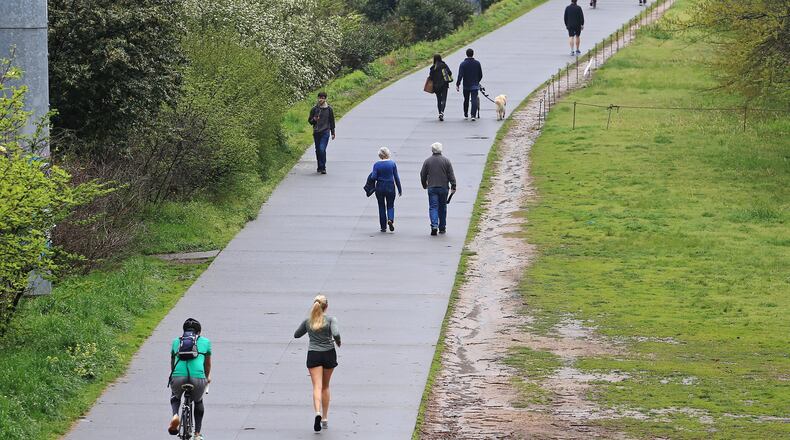The stay-at-home order that Atlanta Mayor Keisha Lance Bottoms issued late Monday resembles several others that cities and states have adopted across the country to stem the spread of the novel coronavirus, but questions remain about how police can enforce the order and how effective it will be if not combined with other strategies.
A New York attorney who has studied numerous stay-at-home orders from cities and states said she is not aware of any instance where a person has been cited or arrested for violating the orders, but she has heard of police breaking up gatherings that surpass limits on crowd sizes.
“We haven’t seen much enforcement yet,” said Hope Sarah Goldstein, a partner at Bryan Cave Leighton Paisner LLP in New York. “But there is a question about how they are going to be enforced.”
It is unclear what charge would come with a violation of Bottoms' order, and an Atlanta police spokesman declined to answer the question in a statement issued Tuesday.
“APD continues to closely monitor the situation while on our regular patrols,” said Police Spokesman Carlos Campos. “If they observe a group or entity in gross violation of the Executive Order, those in violation will be warned and informed of the restrictions within the existing Orders.
“If the issue persists, the City will take the necessary and appropriate actions to resolve the issue on a case-by-case basis.”
Bottoms signed a the stay-at-home order late Monday in response to the coronavirus pandemic. Other than exceptions for "essential" services and businesses, Atlanta residents are directed to stay inside their homes unless seeking some city services, going to grocery stores, gas stations, pharmacies, laundromats, parks, the Atlanta BeltLine and restaurants serving takeout.
While self-isolation is important, Georgia Institute of Technology Professor Joshua Weitz said reducing contact with other people should be part of a much larger response.
Weitz, who leads a research group specializing in how viruses transform human health, posted a model from his team on Twitter predicting that the virus would kill roughly 25,000 people in Georgia by September if they behaved as if things were normal. That number dropped to just over 10,000 deaths when people reduced infectious contact with others by 40 percent.
Weitz later posted another graphic that showed if people reduced infectious contacts by 60 percent, the state could keep the number of deaths at around 100 for the next two months, buying time to develop and implement long-term strategies.
In an interview with The Atlanta Journal-Constitution, Weitz said the model is based on currently available information about how quickly the virus spreads given Georgia’s demographics.
“We know less than we should,” he said. “All projections come with uncertainty.”
Weitz added that he thinks the state should drastically ramp up testing of people who feel slightly ill even if they are not showing symptoms. That would allow those who test positive to isolate sooner and infect fewer people.
If people report their temperatures online, it would help healthcare workers respond to clusters of outbreaks, Weitz said.
“It’s better to take severe precautions,” Weitz said. “At the time they appear as if they are too much, afterwards it may appear they were not enough”
Bottoms’ order contains 21 exemptions for businesses deemed essential. Those carve outs allow employees to physically report to work and residents to patronize them.
Most non-essential city business already are abiding by the rules in the order, said Central Atlanta Progress President A.J. Robinson.
But Robinson said the mayor’s order forces the issue for some businesses — such as barbershops and nail salons — that haven’t taken the pandemic as seriously as they should.
Atlanta Council President Felicia Moore called the order a good first step.
“Eventually it may need to be more aggressive and enforceable,” said Moore, who has publicly called for a statewide stay-at-home order.
Moore also said that the city should probably shutdown the BeltLine because the path makes it difficult for people to maintain the recommended six feet of distance from one another.
Bottoms’ order mentions that 24 clinicians have recommended that Georgia issue a stay-at-home order for the next two weeks. But under city code, the order expires in 72 hours. A spokesperson said the mayor will re-issue it.
The order is one of several that Bottoms has issued in recent days in response to the virus. The city code requires city council to ratify them at its next meeting, which is April 20.
The code does not appear to contain a provision that permits the mayor to perpetually re-issue expired executive orders. Moore said she would ask council members if they should hold a specially called meeting to consider legislation ratifying Bottoms’ order.
“It’s time to decide the council’s course on these executive orders,” Moore said.
About the Author
Keep Reading
The Latest
Featured



